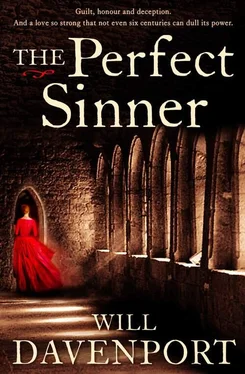The Perfect Sinner
Will Davenport
In memory of Tony Dixon who knew this story. The estuary wil always be his merchant.
In all his life to any, come what might He was a true, a perfect gentle-knight. Speaking of his equipment, he possessed Fine horses but he was not gaily dressed. He wore a fustian tunic stained and dark With smudges where his armour had left mark.
Geoffrey Chaucer.
Prologue to The Canterbury Tales.
Cover Page
Title Page The Perfect Sinner Will Davenport
Epigraph In all his life to any, come what might He was a true, a perfect gentle-knight. Speaking of his equipment, he possessed Fine horses but he was not gaily dressed. He wore a fustian tunic stained and dark With smudges where his armour had left mark. Geoffrey Chaucer. Prologue to The Canterbury Tales.
CHAPTER ONE
CHAPTER TWO
CHAPTER THREE
CHAPTER FOUR
CHAPTER FIVE
CHAPTER SIX
CHAPTER SEVEN
CHAPTER EIGHT
CHAPTER NINE
CHAPTER TEN
CHAPTER ELEVEN
CHAPTER TWELVE
CHAPTER THIRTEEN
CHAPTER FOURTEEN
CHAPTER FIFTEEN
CHAPTER SIXTEEN
CHAPTER SEVENTEEN
CHAPTER EIGHTEEN
CHAPTER NINETEEN
CHAPTER TWENTY
CHAPTER TWENTY ONE
CHAPTER TWENTY-TWO
CHAPTER TWENTY-THREE
CHAPTER TWENTY-FOUR
CHAPTER TWENTY-FIVE
CHAPTER TWENTY-SIX
CHAPTER TWENTY-SEVEN
CHAPTER TWENTY-EIGHT
HISTORICAL NOTE
Acknowledgement
Also by Will Davenport
Copyright
About the Publisher
All my life I have been burdened with a good reputation. I do not deserve it. I will be ripped on the racks of Purgatory until the Day of Judgement for what I have done.
Do you know what that would be like? I’m not afraid of wounds and I have had plenty of them. In battle the pain arrives later and always passes in time. A man can stand that. To be burnt and torn and stabbed for a thousand ages is another thing entirely. The fear of it stalks in the animal form of my sin. It scratches at my door and leaps on me when I wake and I cannot keep it away. My three sins came one after the other, a year between the first two and then two years to the third. I have confessed the first of them and been given inadequate penance. I have tried to confess the second, but the priests will not see it my way. I have kept the third and greatest entirely to myself, saving it for my deathbed.
The worst of it is that my wife Elizabeth shared that first sin and in the long and lonely years since she died, I have feared for her even more than for myself. Time crawls by in Purgatory and the punishment there is dreadful.
Now, in this year of 1372, on the day of the consecration of my Chantry, I was given hope because I saw Elizabeth again. I looked up from where I was doing my stiff best to kneel in prayer and I saw her standing up there in the new stained glass blazing with sunlight. She was young again and she spoke with that angelic voice which always plucked directly at my heart and she used it to bring me a gift.
I have been trying to make up for my second sin, you see. It took place in war and was a sin of omission. There was an act I failed to prevent. War has battered into me the slow realisation that it is man’s most natural state, a base business painted with glory only for disguise, but this act was the basest of its parts. I will speak out now as I should have spoken then. Our war with France has lasted all my adult life and now at last I know the shape of what I want to say. For an entire year I have been struggling for the right words. Now she came to me and flamed up there in the December sun. Elizabeth, a creature of pure light, gave me my opening line.
‘Old men who stay behind,’ she said, ‘old men who stay behind, do not inflame the young with words of war.’
Perhaps it came from inside me and not from her at all, but I don’t think so.
There are days which lie in ambush for you from the moment you are born. I had thought it was a day of endings, the dedication of my chapel, the setting in stone of the knowledge that came too late, my plea for forgiveness. Instead it was the very opposite, and before this winter day was finished I was to meet a man who would make me look at it all afresh.
As I stared up above the altar, Elizabeth slipped away from where she had stood smiling in the window and there was the Madonna Maria Virgine in her place, no less fine than she ought to be, but a picture on flat glass and no more than that. I fought down my keen regret because one should never feel regret at the sight of the Madonna, and there was some comfort to be taken. Elizabeth had seemed serene and the Madonna had let her share her space. She could be saved.
When Elizabeth died thirteen years ago, I had Hugh’s tomb in the Abbey opened and laid her next to him and there they lie, the two Despensers, just as if she had never been Elizabeth de Bryan, just as if two of my sins had never taken place. As if I had never been. It was not because I thought she loved him more than me. Indeed, I knew that could not possibly be the case. We had our years together, Elizabeth and I, and though they started later than they should have done, they were as sweet a time as I could ever have hoped for. Together, we had a natural harmony in everything we did, and our marriage felt to me like a long-delayed arrival home. It was just that in the Abbey, in the immediate sight of God, there was sin to consider and it seemed more proper that she should lie there with Hugh. When death comes for me they will put me close by, just across the aisle, in a tomb to match hers so that I will be but a hand-clasp away.
Hugh Despenser, you see, was the bravest and most admirable of men and he had to steel himself, against his natural inclination, to act that way, which makes my sins all the greater because two of them were against him. We first fought side by side a quarter of a century ago at the crossing of the Somme. He won the day for us at Blanchetaque, struggling through the water to beat the enemy off the far bank. He saved an entire English army that day with heroism that took your breath away and should have taken his.
Bad memories are the hardest rock and stand out more and more as the softer stuff gets washed away. What happened two days later in that August of 1346 ranks among the worst. We were across that bloody valley and they were coming up at us in numbers you could not believe. It was a typical late summer evening and, with the low sun behind us, they stood out so clearly, every detail of their equipment and their weapons, the straps and the steel, as fine and precise as a painting. In the glare they could not see how thin we were in our tired lines. We were dark reapers against the sun and we scythed them down until we were astonished by the slaughter and unsure if they would ever stop.
My post was by the King up on the hill, behind in his final reserve, and my duty was to watch, which is the hardest thing. They came in ranks a hundred soldiers wide, pushed forward by the weight of thousands more behind. Those behind had no clear view until those before them fell. Only then could they see that they were already as good as dead, invincible certainty draining into despair in the very last yards of their advance.
My second sin is coming with the smell of sulphur on its breath.
This tale will not allow the absence of its villain for a line longer, and there’s a pity. He has to come into it now. Sir John Molyns. Molyns the robber, Molyns the murderer. The King had hunted Molyns for his destructive violence. Now he was valued for that same quality. Now he was restored and there he was just ahead of me, down there in our line, about to commit a terrible act, and I should have prevented him from doing it. The King gave me the power to stop him and I chose not to use it. That was my second great sin.
Читать дальше












